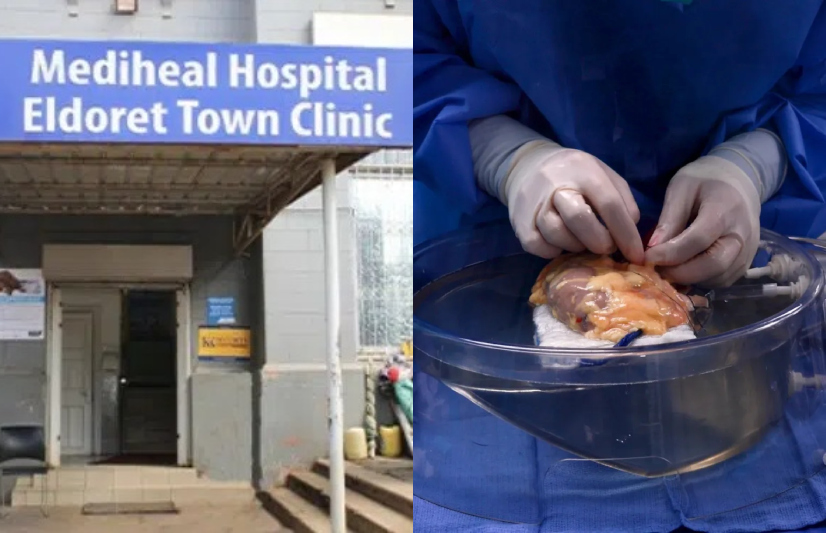Ministry of Health has confirmed troubling findings from a government-led investigation into Mediheal Hospital and Fertility Centre, raising new fears about a possible international organ trafficking syndicate involving vulnerable patients and wealthy foreign nationals.
The revelations follow a months-long probe by a multidisciplinary team of medical and ethics experts, triggered by an alert from the Global Transplantation Society, and parallel reporting by German media giants Deutsche Welle (DW), ZDF, and Der Spiegel that placed Kenya—and Mediheal in particular—at the epicenter of a clandestine kidney trafficking network.
Health Cabinet Secretary Aden Duale, speaking at a press conference on Tuesday, April 15, 2025, said the fact-finding mission was launched after the Society flagged a suspicious surge in kidney transplants involving Israeli nationals at Mediheal’s Eldoret facility.
Between 2018 and 2023, Mediheal conducted 372 kidney transplants, with patients traveling not only from within East Africa but also from as far afield as Israel, Japan, Australia, the UK, and the U.S.
While the hospital employed advanced surgical techniques and collected donor consent forms, the audit uncovered serious irregularities that raise questions about whether Kenya’s medical systems have been compromised by global trafficking cartels.
Key Findings from the Government Audit
1. Donor-Recipient Relationships Largely Unverified: The hospital failed to provide adequate documentation confirming biological or personal ties between donors and recipients, particularly in cross-border cases — a key red flag for trafficking.
2. Unregulated Export of Human Samples: All HLA (Human Leukocyte Antigen) testing was reportedly done in India, without government approval to export human tissues, violating local laws.
3. Language Barriers in Consent Process: Non-English-speaking patients were given English-only documents, raising ethical concerns about the validity of their consent.
4. High-Risk Transplants and Questionable Ethics: The audit identified instances where transplants were carried out on patients with cancer or others deemed high-risk, despite poor donor-recipient compatibility.
5. Lack of Oversight: The hospital did not hold proper multidisciplinary team (MDT) reviews before surgeries, and failed to provide clinical outcome reports, making it difficult to assess patient safety and medical ethics compliance.
Ksh25.9 million Price Tag Per Kidney
According to the German exposé, Mediheal became a hotbed for “transplant tourism,” with foreign patients allegedly paying up to $200,000 (Ksh25.9 million) for kidney transplants — a fee far beyond what’s legal or ethical in many jurisdictions.
Investigators traced a trail from Mediheal to a shady medical facilitation agency in Germany that allegedly preyed on financially desperate young Kenyans willing to sell their organs, pairing them with wealthy international recipients.
The findings painted a grim portrait of global exploitation, where the poor become biological suppliers for the rich.
CS Duale said while the investigation stopped short of directly implicating Mediheal in trafficking, the mounting evidence of systemic failure and “glaring loopholes” now necessitates deep criminal investigations by the police and anti-corruption agencies.
“We are closing the doors to transplant tourism and trafficking in Kenya. We will not allow the commodification of human organs under the guise of medical tourism,” Duale said.
Among the recommendations already under implementation:
1. A national donor-recipient registry with verified identity and relationship data
2. Mandatory MDT reviews and audits for every transplant case
3. A bill on the use of human organs, tissues, and cells awaiting public input
4. Strict licensing, compliance checks, and sanctions for hospitals found breaching medical ethics
A follow-up audit is planned for Mediheal Hospital, and all seven licensed transplant centers in Kenya are now under review.
Crackdown Looms
The unfolding scandal has stirred national outrage, prompting calls for justice, tighter regulation, and protection of vulnerable Kenyans who may have been coerced or misled into organ donation.
Meanwhile, law enforcement is pursuing more leads into the financial and logistical networks behind the alleged organ trafficking chain, which may involve both local health officials and international middlemen.
As global attention turns to Kenya’s private medical sector, the Mediheal case now stands as a chilling reminder: in the shadows of modern healthcare, exploitation can be expertly masked as lifesaving treatment.

